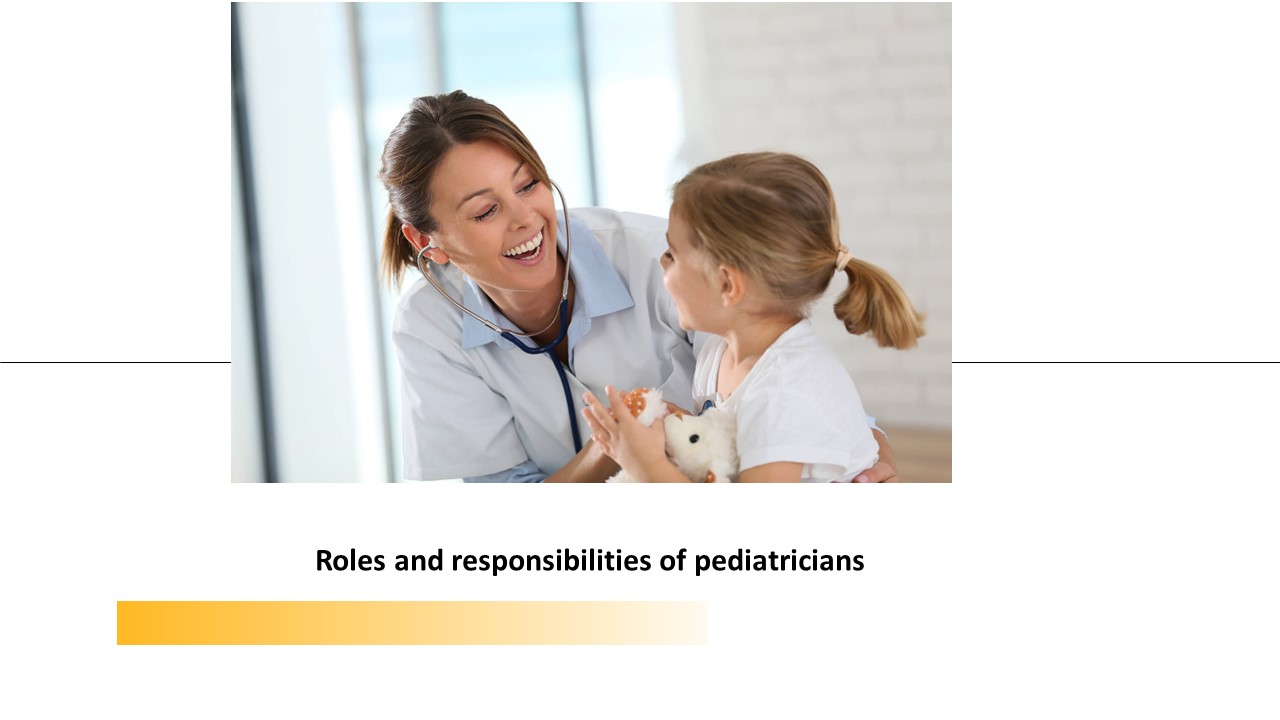Roles and responsibilities of pediatricians - PowerPoint PPT Presentation
Title:
Roles and responsibilities of pediatricians
Description:
A paediatrician is a doctor who treats babies, children, teens, & young ones. Pediatricians have a big impact on the health & wellbeing of the kid. – PowerPoint PPT presentation
Number of Views:4
Title: Roles and responsibilities of pediatricians
1
Roles and responsibilities of pediatricians
2
- Introduction-
- A paediatrician is a doctor who treats babies,
children, teens, young ones. Pediatricians have
a big impact on the health wellbeing of the
kid. They are in charge of a wide range of
duties, such as regular child examination and the
testing and treatment of illnesses, injuries, and
other medical conditions. - Who are pediatricians?
- A child receives paediatric care from the moment
of birth until the teenage birthday and later.
Pediatricians work to prevent, explore, as well
as treat various health, behavioural, and
developmental issues that affect kids. The best
pediatric hospital in hyderabad, there are
paediatricians who also practise medicines on
general level. Others focusing areas are on
providing care for children who have specific
medical conditions.
3
- What is a pediatrician's responsibility and what
conditions may they treat? - Pediatricians are in charge of a variety of
duties. They handle everything, including
maintaining long-term medical conditions and
doing well-baby exams. Pediatric health
consultants only identify and treat diseases,
injuries, or infections, but they also provide
preventive care. - Several roles are as follows-
- Conduct regular checks on the wellbeing and
health of youngsters. - Conduct physical exams
- Monitor the children's physical, intellectual,
and social development. - Identify and treat illnesses, accidents, and
other health problems. - Offer immunizations.
- Issue prescriptions for medication.
- Attend towards the parents' concerns and
questions. - Offer health advice to parents.
- When necessary, recommend professionals to
families. - Contagious illnesses
4
- Runny noses, runny nose, fever, throat
irritation, sneezing, as well as other symptoms
are some of the conditions that may result from
colds, viral flu, as well as other diseases.
Pediatricians if the child's symptoms worsen,
they continue for more or more a week, they have
a fever of 104 degrees Fahrenheit or higher, they
can't even stop coughing, their fever seems to
last more than just a few days, and they have
persistent vomiting or diarrhea. - Pediatricians must also
- Diagnose and treat prevalent childhood illnesses
as well as minor injuries - Refer patients to professionals for additional
treatment and care when necessary - Provide preventative care, such as vaccination
recommendations - Keep records of their patient's growth and
development as well as - Effectively communicate to parents their
patients' wellbeing, nutritional, as well as
fitness needs.
5
- The infant should see its first doctor 48 to 72
hrs since being released from the hospital.
Between two to four weeks following delivery is
when the second visit should take place. Your
child should see a doctor at 2, 3, 6, nine, as
well as twelve mnth old during the first year. - Following their second birthday, the kid should
be evaluated at 15, and 24 months. After that,
your child's doctor advises annual visits. If you
are having a medical problem or if your child is
ill, you may book an appointment anywhere at
time.
6
- A pediatrician is a physician who specializes in
the care of infants, kids, adolescents, young
adults. Top Pediatricians in Hyderabad might
practice as general practitioners or focus on
treating kids of a certain age or kids with a
particular illness. Young children and infants
should see the doctor often, according to
caregivers and parents. Annual well-child
checkups might be advantageous for older kids and
teenagers. - ConclusionDuring the late teenage years or the
beginning of adulthood, patients have the option
of switching to physicians who treat adults. Your
child's physician, their preference, and
sometimes insurance coverage all play a role in
the decision to switch providers.
7
(No Transcript)































